Input interpretation

acetylene
Chemical names and formulas

formula | C_2H_2 name | acetylene alternate names | acetylen | ethine | ethyne | narcylen mass fractions | C (carbon) 92.3% | H (hydrogen) 7.74%
Lewis structure
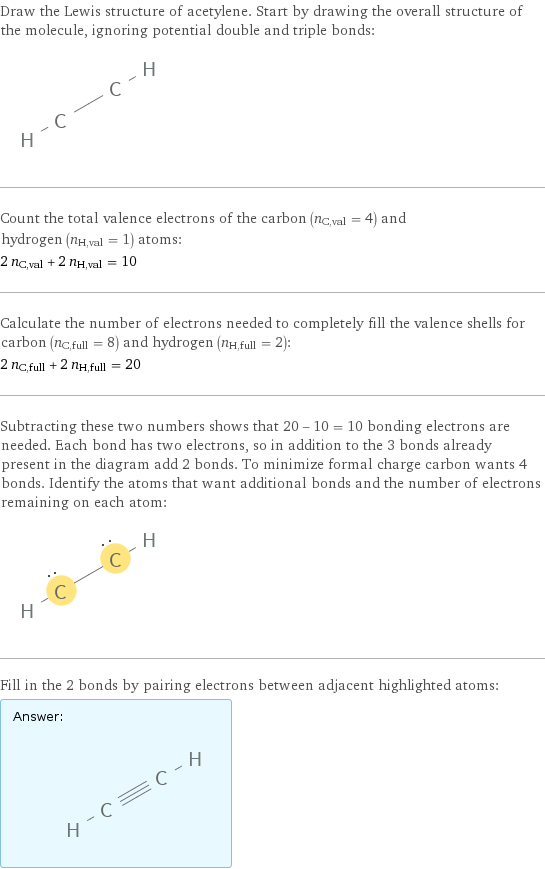
Draw the Lewis structure of acetylene. Start by drawing the overall structure of the molecule, ignoring potential double and triple bonds: Count the total valence electrons of the carbon (n_C, val = 4) and hydrogen (n_H, val = 1) atoms: 2 n_C, val + 2 n_H, val = 10 Calculate the number of electrons needed to completely fill the valence shells for carbon (n_C, full = 8) and hydrogen (n_H, full = 2): 2 n_C, full + 2 n_H, full = 20 Subtracting these two numbers shows that 20 - 10 = 10 bonding electrons are needed. Each bond has two electrons, so in addition to the 3 bonds already present in the diagram add 2 bonds. To minimize formal charge carbon wants 4 bonds. Identify the atoms that want additional bonds and the number of electrons remaining on each atom: Fill in the 2 bonds by pairing electrons between adjacent highlighted atoms: Answer: | |
3D structure

3D structure
Basic properties
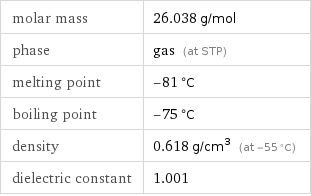
molar mass | 26.038 g/mol phase | gas (at STP) melting point | -81 °C boiling point | -75 °C density | 0.618 g/cm^3 (at -55 °C) dielectric constant | 1.001
Gas properties (at STP)
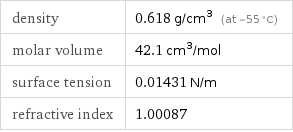
density | 0.618 g/cm^3 (at -55 °C) molar volume | 42.1 cm^3/mol surface tension | 0.01431 N/m refractive index | 1.00087
Units

Thermodynamic properties
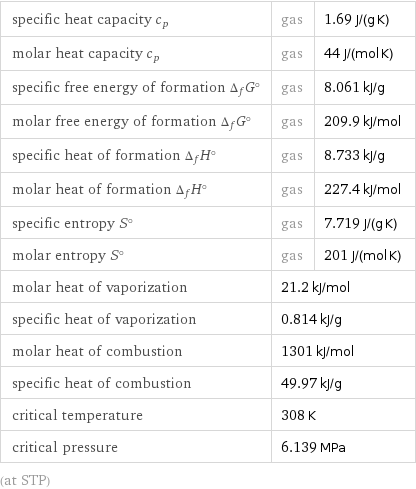
specific heat capacity c_p | gas | 1.69 J/(g K) molar heat capacity c_p | gas | 44 J/(mol K) specific free energy of formation Δ_fG° | gas | 8.061 kJ/g molar free energy of formation Δ_fG° | gas | 209.9 kJ/mol specific heat of formation Δ_fH° | gas | 8.733 kJ/g molar heat of formation Δ_fH° | gas | 227.4 kJ/mol specific entropy S° | gas | 7.719 J/(g K) molar entropy S° | gas | 201 J/(mol K) molar heat of vaporization | 21.2 kJ/mol | specific heat of vaporization | 0.814 kJ/g | molar heat of combustion | 1301 kJ/mol | specific heat of combustion | 49.97 kJ/g | critical temperature | 308 K | critical pressure | 6.139 MPa | (at STP)
Chemical identifiers
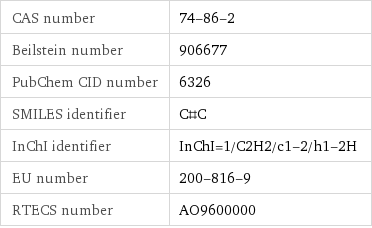
CAS number | 74-86-2 Beilstein number | 906677 PubChem CID number | 6326 SMILES identifier | C#C InChI identifier | InChI=1/C2H2/c1-2/h1-2H EU number | 200-816-9 RTECS number | AO9600000
NFPA label

NFPA label
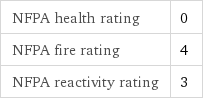
NFPA health rating | 0 NFPA fire rating | 4 NFPA reactivity rating | 3
Safety properties
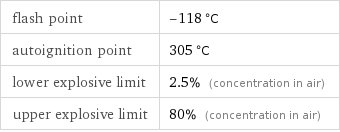
flash point | -118 °C autoignition point | 305 °C lower explosive limit | 2.5% (concentration in air) upper explosive limit | 80% (concentration in air)

DOT hazard class | 2.1 DOT numbers | 1001
Toxicity properties

RTECS classes | human data